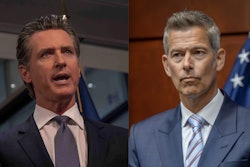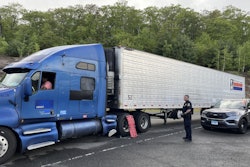Florida Attorney General James Uthmeier on Wednesday filed a lawsuit against California and Washington after the states issued a CDL to Harjinder Singh, the "illegal alien" driver whose reckless U-turn on the Florida turnpike killed three on August 12.
"California’s and Washington’s open defiance of federal immigration laws is well-documented," according to the lawsuit's Bill of Complaint.
The lawsuit cites Overdrive reporting on California's failure to enforce English language proficiency regulations and Washington's mistakes in issuing Singh a CDL. "Both States routinely frustrate and hinder federal law enforcement from addressing the immigration crisis and the destruction that accompanies it."
California and Washington "chose to ignore" CDL licensing and ELP standards to "authorize illegal immigrants without proper training or the ability to read road signs to drive commercial motor vehicles," the lawsuit continues. "California’s and Washington’s decision to endanger their own citizens is reprehensible. But commercial drivers routinely cross state lines, endangering citizens of other States."
Licensing people like Singh, the lawsuit reasons, results in "mayhem" like the crash on August 12 and a "flurry of costly preventative measures by Florida to limit the dangerous and improperly licensed drivers from threatening its roads and its citizens." Those measures in Florida included stepped up ELP enforcement at its agricultural truck inspection stations.

The lawsuit seeks two major judgements from the Supreme Court:
- "Declaratory judgment that California’s and Washington’s sanctuary laws, to the extent that the laws prohibit agencies administering CDL programs from inquiring into or collecting information about an applicant’s immigration status, are preempted" by federal law, according to the suit, and:
- "Declaratory judgment that California’s and Washington’s failure to enforce proper safety and immigration-status standards is a public nuisance."
It goes on to ask for preliminary and permanent injunctions "ordering California and Washington and their agents to cease the issuance of Commercial Learner’s Permits and CDLs" to non-citizens who don't have permanent legal status.
Both California and Washington have, in line with DOT's new rule seeking to boot 194,000 non-domiciled CDL holders from driving jobs, currently stopped issuing non-domiciled CDLs.
Florida in the lawsuit asks for costs and expenses associated with its legal action to be remedied by the two West Coast States, as well as any "other relief as the Court deems just and proper."
 Florida has been vigorously promoting the suit on social media and elsewhere with this flier, which doesn't mention Washington.
Florida has been vigorously promoting the suit on social media and elsewhere with this flier, which doesn't mention Washington.
The Florida suit's allegations in detail
The suit offers up extensive detail on the CDL licensing process and President Donald Trump's April executive order mandating ELP for all truck drivers in the country.
The suit's factual allegations include a brief history of CDL credentialing in California and Washington. Until 2013, California required any driver's license applicant "to provide their social security number," the lawsuit said. "In 2013, California began granting regular [non-CDL] driver’s licenses to individuals who are 'unable to provide satisfactory proof that [their] presence in the United States is authorized under federal law.'"
The Golden State "has since rejected those federal standards" for authorized legal presence with the 2017 adoption of the California Values Act, according to the suit. Florida states the Act's sponsor "admitted that the law was aimed at 'put[ting] a kink -- a large kink -- in [President] Trump’s' efforts to enforce federal immigration law." The suit also cited then-California Governor Jerry Brown as saying the law was designed to give "comfort" to illegal aliens living in California.
After the law's passage, the state no longer allowed law enforcement agencies, including the DMV, to inquire about an individual's immigration status, according to the lawsuit.
The lawsuit goes on to point out that California has conducted 34,000 inspections resulting in a violation since June, and only one of them was an ELP violation that resulted in a driver being put out-of-service. However, as DOT has noted before, drivers put out-of-service are not always recognized in subsequent stops.
[Related: Why state police are letting drivers placed OOS for English violations go free]
"California inspected at least 23 drivers with documented English-language proficiency violations from other States and yet failed to enforce these violations and allowed each driver to stay on the road," according to the suit. The allegation is quite similar to one lodged in an August press conference in which DOT Secretary Sean Duffy called out California, Washington and New Mexico for pulling over/inspecting truck drivers with OOS orders on their records and letting them go.
Washington passed a similar law in 2019 called the "Keep Washington Working Act" that limited inquiry into citizenship status of driver's license applicants.
The lawsuit alleges Washington has put very few drivers OOS for ELP violations, but Washington previously said it implemented ELP enforcement only recently, this month. New Mexico said the same. As for California, the DOT has pulled up to $40 million in federal funding for the state's inspections program over its failure to enforce ELP regulations.
The lawsuit then cites a laundry list of crimes Florida says were committed by illegal aliens who were given "sanctuary" in California and Washington. Florida's AG estimated the policies of sanctuary states cost Florida $2 billion annually.
Finally, the lawsuit addresses the well-known crash of Harjinder Singh, calling him an illegal alien and recounting the U-turn he attempted across a busy highway in August. "He was attempting to use an official access point that was marked with a red 'no U-turn' sign and a message that warned 'OFFICIAL USE ONLY,'" the suit said. "The erratic turn created a sudden barricade across the roadway. A minivan then collided with the truck trailer. The minivan’s driver and two passengers were killed.
"All of this was preventable. In fact, all of this was already illegal."
The suit details Singh's (somewhat disputed) ELP assessment in the aftermath, which he failed, unlike the results from an inspection in New Mexico several weeks earlier where he was issued a ticket and got through a Level II inspection.
The suit then alleges a shocking detail about Singh's first CDL, issued by Washington: "Washington improperly issued this illegal immigrant a CDL in 2023, after 13 failed examinations."
Washington previously admitted it made mistakes in issuing Singh a regular-term, full CDL rather than what he should have gotten, a non-domiciled CDL, but blamed it on a lack of training. That explanation wasn't good enough for Florida.
"Florida is aware of no legislative or regulatory change to Washington’s sanctuary laws or licensing scheme" that have followed the revelation of the mistakes made in Singh's licensing, according a footnote in the lawsuit citing Overdrive's story about Washington's efforts to address CDL program deficiencies.
"California and Washington have not displayed a willingness to meaningfully remedy the present situation and prevent future harms to Plaintiff," the factual allegations of the suit conclude. "Unless addressed by this Court, California and Washington will likely continue to issue CDLs to unqualified illegal aliens in violation of federal standards."
Overdrive reached out to both Washington and California for a response, but did not hear back in time for publication.










